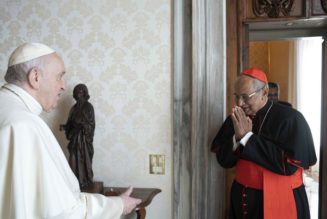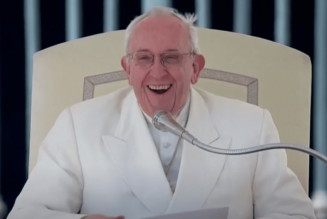
I recently helped a friend move into his new home. He is a Catholic priest and got assigned as Pastor to a new parish. This parish has multiple locations and dozens of buildings. When he realized just how many things he is responsible for, it was a bit disorienting. It was also clear that he is stepping into a situation where some of these responsibilities are possible distractions to that which is much more important – the mission of his parish.
Think of what it takes to maintain parish buildings at such a parish.
Time.
Money.
Effort.
Etc.
It isn’t easy. The bills never stop because utilities and maintenance are always needed. The needs never go away.
Yet, without a proper perspective, buildings (and other parts of maintaining a parish, school, diocese, etc) may cause us to shift our gaze away from our true mission.
What is our mission supposed to be?
*Making disciples.
This is why Catholic institutions exist in the first place. To make disciples. If a building (or any other thing) causes us to shift our gaze away from our mission, then it can also cause us to be distracted from what we ought to be doing.
When our gaze shifts, the Church starts to lose its mission of making disciples.
Whenever the Church loses its mission people lose their faith.
Now we have come to the heart of the reason we have decline in Western Catholicism. We aren’t living out our mission as we are supposed to. We are distracted and off-track.
DISCLAIMER – I am not saying buildings are the primary cause of the decline in Western Catholicism, rather they are a symptom of a deeper problem – the loss of our purpose and mission.
REPLACING OUR MISSION FOR METHODS
Good leaders with the wrong mission may gather crowds, raise up new buildings, grow budgets, do lots of busy things at church, run a lot of programs/events – but still may watch their parishes and dioceses stagnate or even shrink. Why? Because while they may certainly be leading people, they may also be leading them in the wrong direction.
The mark of success for every Catholic ministry and institution is not found in the number of groups, the growth of income, the hits on a website, etc. It certainly isn’t just attendance. The true mark of success is whether or not disciples are being made. After this, the next step is to raise up disciples into mission and maturity – thus becoming missionary disciples who are raising up even more missionary disciples like themselves.
But, let us be clear – most Catholic institutions in the West are not growing at all, they are declining. Yet, most leaders are only making minor shifts in methodology and expect to see big changes. This is the definition of madness. It is also a mark of valuing our methodology over our mission! We have replaced our mission for our current methods.
The methodology may change, but the mission remains the same always. Thus, we can’t change the mission, but we CAN and SHOULD change how we go about achieving our mission, especially in times when the methods are no longer working.
Since church attendance has been in decline for decades, when is a better time to change? Even in the midst of a pandemic we can use it for leverage to make needed changes. In fact, emergencies can stimulate needed change and be an excuse for those changes.
CHANGE IN METHOD NOT MISSION
All that Jesus taught and said was true. Through his words, he revealed the content of the faith that Christians are bound to believe. All of our Catholic doctrines are based on Jesus’ teachings. But, what Jesus revealed to the world was not only through words, but also through the way he lived his life. He revealed not just truth, but a way of living and a way to make disciples (as well as how a disciple is to live, evangelize, and lead others). These evangelization / discipleship principles he modeled for us are as true as anything he ever said.
A problem with the modern Church in the USA is that we have largely hung onto truth, without living out discipleship principles fully – yet we expect the same results as the early Church. I imagine that to the early Christians the idea that all we would need is the truth, without the revealed way of living as missionary disciples, would seem foreign to them. It would be like Jesus saying “I am the truth” without also being the “way and the life” as well.
We have many busy things going on in our parishes (during normal times). Events. Programs. Classes. But do they all fulfill the mission of making disciples? If not, then they do not exist for the mission of the Church. They exist for themselves.
While good people, with good intentions, may have started and run these activities, we must start to make decisions that are based on fruitfulness, not merely history and/or activity. The question is whether people show up. Rather, the questions ought to be:
Are the activities we have fruitful? + Do our activities fulfill the mission of making disciples?
If the answer is “no”, then they have to go, because they are a distraction to our mission.
The same goes for our buildings. If we spend too much time and money on maintaing them, we have to make changes that reorient us back to fruitful mission.
MISSIONARY DISCIPLES
What we need is a correction in our methodology. A shift that takes us from seeking institutional management and our personal comfort to becoming true missionary disciples who want to get others to heaven. So, what makes a missionary disciple? It includes several things, including:
- A missionary disciple has been converted to Jesus. They have made the conscious choice, in faith, to put Jesus at the center of their life. They do this again and again, thus making conversion a lifestyle, not merely a moment.
- A missionary disciple knows the content of their faith, especially the Bible. They will read, pray with, and study the Scriptures frequently. It also includes knowing the teachings of the Catholic Church.
- A missionary disciple has a heart for evangelizing those that are not disciples. They seek relationships with those that are not like them and understand that the word “missionary” means actively proclaiming the kerygma to those who don’t believe in Jesus.
- A missionary disciple lives out the spiritual and corporal works of mercy. They love those who are poor and oppressed and seek to serve those that need our help.
- A missionary disciple allows the teachings of the Church to transform their heart, especially those areas of teaching which are most difficult to live by. They allow the faith to inform their politics, rather than letting politics inform their faith.
- A missionary disciple lives in community with other disciples (to be strengthened by them), but also seeks out non-disciples to draw them to Jesus.
- A missionary disciple is constantly seeking out the graces of the Sacraments and fleeing from a sin. They are humble enough to admit their failures and work on their habits. They seek out accountability and authentic relationships.
- A missionary disciple maintains a daily personal prayer life that is nourished by intimacy with the Holy Spirit.
- A missionary disciple is fruitful and faithful to the mission of Jesus. IF we are followers of Jesus who share in his mission, then we MUST share our faith with others, esp. outside the walls, programs, and events at church. God’s mission is to save the world through his church. Through you.
Now imagine a parish where a majority of peoplel are living out their faith in such a manner.
Making one or two missionary disciples is hard work. Changing an entire parish culture into becoming a hothouse of missionary discipleship is much much harder. Most Catholics just aren’t there yet. In fact, most Catholic leaders are not there yet.
Too many have settled into routines and comfort, rather than radical discipleship that sends us out to the world that needs us. Since this is the case, you may not have many models of missionary discileship on your road to growing into as a disciple. But, know this – nobody can stop you from being a missionary disciple yourself or from making missionary disciples of others. Nobody, that is, except you. You don’t have to wait for a leader to let you go evangelize. If you are a baptized / confirmed Catholic, then you have all the grace you need for mission. The question is whether you will say “yes” to that grace or not. I have not been formally “involved” in a parish for four years (outside of the Sacraments). But, I am still making disciples.
Furthermore, \if we are going to make needed institutional changes, we can’t and won’t do it alone. We need others.
THE METRICS FOR RENEWAL
The most important Catholic ministry metric is measured by grace that changes the heart, not attendance. Look again at how the early Christian community operated. Attendance at the sabbath worship was not the goal, transformation was. Spreading salvation by making disciples was. Attendance naturally happened when someone was converted to Jesus. They helped potential disciples know what they were doing and walked with them through the process of becoming a disciple and what that meant.
The commands of Jesus include:
- “Pick up your cross daily and follow me”
- “Follow me and I will make you fishers of men”
- “Whoever follows me will never walk in darkness, but will have the light of life.”
- “If anyone serves Me, he must follow Me; and where I am, there My servant will be also; if anyone serves Me, the Father will honor him”
- Etc
To follow him naturally includes communal worship. Thus, we have a progression.
- Call of Jesus to follow him (gift of grace enabling one to respond)
- Human response to the invitation (acceptance of grace)
- Conversion and transformation (changed by grace)
- Disciple (follower) is made
- Growth in discipleship (ongoing conversion which naturally includes attendance at Mass & more)
Parishes that form missionary disciples will grow.
Parishes that try to get people to come to Mass will decline.
But what about all the buildings?
Of course Catholic leaders can’t just leave the parish buildings behind. Of course they can’t abandon the upkeep of them. But they can reprioritize what is most important. You can too if you are a Catholic leader.
If you want to know what is truly valued by your parish, then look at your budget and calendar. These tell you where your priorities lie. Parishes ought to be putting a good bit of time and money into the Sacraments. Beyond that, almost everything else needs to be assessed closely.
Click here for a free assessment tool for parishes.
Finally, know that renewal is worth the effort, the time, and the money.
——————–
If you are a parish or diocesan leader and want more information about how we help leaders change culture – please contact us here.
Join Our Telegram Group : Salvation & Prosperity









